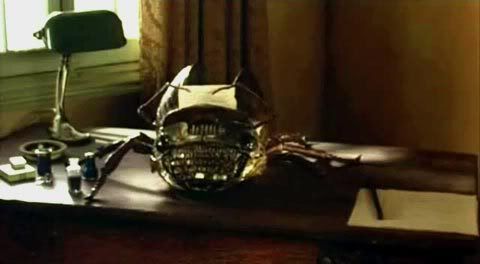Naked Lunch and Ivans the Terribles
Naked Lunch, David Cronenberg. [A] august 1st 2007.
It seems that today's entry has a sort of hallucinatory undercurrent running through it, which is nice. I like themes. I've been engaging in some debate recently about David Lynch's Inland Empire, the topic being the film's obtuseness. It came up when the movie was first released into theaters, mostly brought up by a surprisingly high number of dismissive critics, and now that the DVD release is imminent and rips have leaked and spread across the internet like wildfire, it's starting to become a topic of discussion again.
For my part, narrative obscurity is never a sin. The tactile visual and aural experience of the film can be as important as the story or even come to replace it. I know that my position should be that film is above all a visual experience and blah blah blah, but there are "theatrical" films that I enjoy a whole lot, relatively uninterestingly shot films whose stories are compelling enough that I overlook their less interesting aesthetics, etc. Inland Empire is a film for which the inverse is true: the film looks and sounds and flows so wonderfully that the actual narrative, which I can't address at all, not having seen it in eight months or so, takes a back seat for the ride. This isn't to say that the film doesn't have "things to say," simply that they're presented, perhaps, in a more associative, metaphoric way, left open for personal interpretation and processing. Inland Empire is a poem, not a novel.
This is what I value about Naked Lunch as well. Obviously, it's based on a novel, but the film, like the novel (or so I hear), operates on a more open narrative level, one that can be more closely linked to poetics than traditional narrative. The film feels episodic, as if each scene exists on its own, even as it follows a tangible narrative thread. Things happen seemingly without reason: people change and become other things, some are monsters and some are witches, typewriters become bugs or alien-like creatures that discharge a sort of come-y goo that provides inspiration, drug abuse becomes writing becomes sexual denial becomes paranoid conspiracy theories and somehow a story results from all of these elements.
The story is coherent but it proceeds in a free-associative way. I can't imagine how this film got written or shot, it feels like a constant juggling act between coherent narrative, seemingly random flights of fancy, an obscured biopic by way of adaptation by way of drug-induced nightmare. And within it all, considerations of the nature of creativity, sexuality, madness, friendship, masculinity, life are all addressed, riffed on and distorted. This movie's dense, insane and beautiful. At its core it captures that feeling that making art can give you - it's ultimately about the act of creation and how difficult it can sometimes be to reconcile a tangible life with it.

Ivan the Terrible Part One, Sergei Eisenstein. [x] august 2nd 2007.
Ivan the Terrible Part Two, Sergei Eisenstein. [A] august 2nd 2007.
And speaking of creation, the two Ivan the Terrible films by Sergei Eisenstein are all about the creation of a legendary persona, the events leading up to a man's metamorphosis into the "Terrible" man he is remembered as. I can't entirely comment on the first because I was unbelievably tired, inattentive and miserable during it, but I got an enormous coffee between screenings and caught all of Part Two. It blew me away. Just look at the shot at the left, which is actually from the first, but still. Visually, it's such a perfect, wildly imaginative movie that it's worth seeing for the images alone. The performances are wild-eyed and mad, really over the top, but there's a sense that every actor is playing their characters in a sort of self-awarely over-the-top way, as if it is not the actor playing Ivan as a wide-eyed ham, but rather playing Ivan as a man playing a wide-eyed ham, in an attempt to retain a degree of artificiality and intimidation in his interactions with others, something which, by the way, I really enjoyed about Christian Bale's Batman in Batman Begins but that a ton of people railed against. There are a couple naturalistic performances in this film that I feel back this theory up.
Part Two is really a tragic film, to me, capturing Ivan's slow realization that his sovereignty is entirely hinged on his being a person distrusting of others, a coldly practical man who has to do bad things to keep his power, who must deal with others hating and fearing him despite the fact that all he really seems to want is a friend. A friend isn't something he'll ever have again, because his friends inevitably turn into assistants and servants, there is a hierarchy in his court and he will never be anything but the head of it. You get enough power and friendsip is impossible, since friendship is hinged on a sense of equality. When Ivan realizes that not even his family is behind him, he finally descends into a dark place that he will clearly never emerge from, erecting an icy barrier around him that no one will ever penetrate again. It's a heartbreaking story, not just because Ivan's lost but because his people are lost, reduced to serfs in his eyes by the end of it. This is a brilliantly filmed portrait of the destructive results of greed and power.
Labels: ivan the terrible, naked lunch




0 Comments:
Post a Comment
<< Home